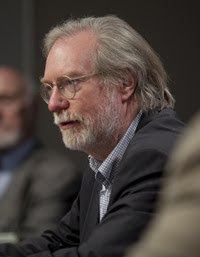
Who owns the planet’s natural wealth found underwater, below ground, and in the air? How do we reconcile our use of these assets with that of future generations? Such questions are the subject of Oxford Professor
Paul Collier’s latest book,
The Plundered Planet: Why We Must–and How We Can–Manage Nature for Global Prosperity, which he discussed at a
recent Wilson Center event.
The author of
The Bottom Billion and
Breaking the Conflict Trap, Collier called Plundered Planet “the most important book I’ve written.” Resources are a “one-shot game,” he said; if we waste them, they’re gone. The next 10-20 years are “vital” to preserving natural assets as new technologies for removing them proliferate.
We’re sucking fish up like “hoovers,” he said, and a combination of technology and economic growth are rapidly
pushing mineral extraction into the few remaining frontiers.
Because time is short, Collier hopes his work will bring economists and environmentalists together. He said the two groups are largely at each other “cat and dog,” yet their objectives–environmental preservation and economic development–are not fundamentally opposed. In fact, to overcome polarization and produce key policy decisions, development and conservation must become partners.
Becoming Custodians, Not Curators
Collier said resource plunder can take one of two forms: “Where the few expropriate what belongs to the many”; and “where nature is expropriated by the present generation and burned up rather than benefiting future generations.” Both forms of plunder not only impede development, but are also unjust, he said.
Unlike other assets–such as books or records, which are typically owned by their authors or artists–natural assets have no human creators. A system whereby “natural assets are owned by the people who are lucky enough to live on top of them” creates “staggering inequality,” said Collier. Instead, resources must be shared equally among all citizens of a nation, including those not yet born.
Yet sharing nature’s wealth with generations to come does not mean leaving all fish in the sea, all trees on land, or all minerals underground. “We are not curators of natural artifacts,” Collier said. “We’re custodians of natural value.”
For the one billion people living in poverty, the development of natural resources can provide a path toward development, growth, and better lives, Collier argued, when properly and justly managed.
Filling the Gaps in Governance
Why have we largely plundered, rather than invested in, our resources thus far? What can be done to change the current principles of resource management? Collier’s short answer: governance.
For the poor countries in the “bottom billion,” Collier said the “broken decision chain” must be mended. The chain has six steps:
- Discovering natural assets;
- Avoiding appropriation by a few at the expense of the many;
- Ensuring local inhabitants receive generous compensation for unavoidable environmental damage;
- Consuming in a way that benefits both the present and the future;
- Investing in the absorptive capacity of government; and
- Investing in domestic development.
Transnational resources–such as fish, air, and deepwater discoveries–need intelligent regulation. “We’re actually subsidizing the plunder of the fish market,” said Collier, effectively giving the fishing industry $30 billion a year–nearly half of its $80 billion annual worth–to deplete fish stocks below sustainable levels. As a rule, he recommended removing subsidies and reforming tax practices.
Igniting a Movement
“There is no substitute…for building a critical mass of informed opinion,” Collier said. While technology enables plunder, it also creates a way for people to share knowledge at tremendous speeds and with wide audiences. The challenge, he said, “is to ignite the information transformation process.” A shift from plunder to sustainable management of transnational and developing country resources is a historic opportunity to benefit the world’s poor. “If these resources are harnessed for sustained development,” he said, “they can drag themselves decisively from poverty to prosperity.” The window of opportunity, however, is closing.
 Who owns the planet’s natural wealth found underwater, below ground, and in the air? How do we reconcile our use of these assets with that of future generations? Such questions are the subject of Oxford Professor Paul Collier’s latest book, The Plundered Planet: Why We Must–and How We Can–Manage Nature for Global Prosperity, which he discussed at a recent Wilson Center event.
Who owns the planet’s natural wealth found underwater, below ground, and in the air? How do we reconcile our use of these assets with that of future generations? Such questions are the subject of Oxford Professor Paul Collier’s latest book, The Plundered Planet: Why We Must–and How We Can–Manage Nature for Global Prosperity, which he discussed at a recent Wilson Center event. A Publication of the Stimson Center.
A Publication of the Stimson Center.




